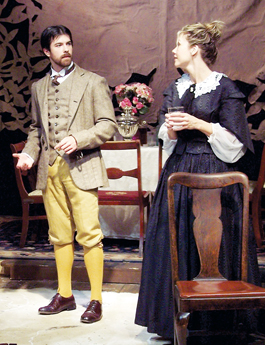home | metro silicon valley index | the arts | stage | review

SIBLINGS: Andrey (Thom Gorrebeeck) and his sister Masha (Liz Coy) deal with life's limits in 'Three Sisters.'
Chekhov Mates
Hope fades for a becalmed Russian family in Pear Avenue's production of 'Three Sisters'
By Marianne Messina
ENNUI CLOSES around Anton Chekhov's Three Sisters like a forced marriage as the Pear Avenue Theatre's Olga (Meredith Hagedorn), Irina (Sarah Cook) and Masha (Elizabeth Coy) invest all their hopes in getting out of a one-garrison town. Each of the three sisters has a unique way of dealing with the limitations of her life. As the married Masha, who is thereby both settled and constrained, Coy plays her feelings close to the vest.
The affair that Masha carries on in the family home with the local battery commander Vershinin (Andrew Harkins) is submerged in the text (until she confesses it to her sisters), and in the many scenes of mixed company, Masha's broody reticence also veils the affair. But Pear Avenue director Jeanie Forte has added little glances, tentative touches and intimate signals (a whistled tune) to indicate the lovers' intimacy and the affair's duration.
The single, 28-year-old Olga has the capacity to accept things and put a happy face on them (Hagedorn makes a warm Olga), though at first she resists the position of headmistress as if it is synonymous with spinsterhood. Cook's Irina imagines her hope out in the wide world; at 20, she confronts life and demands things from it.
In this subdued production, even the drunken parties seem sullen. A tall, white backdrop resembling a lace-edged tablecloth, Alice-in-Wonderland enlarged, draws the eye upward, suggesting a cathedral ceiling. Yet in this expansive space (designed by Ron Gasparinetti), the characters cling to small and repetitive stories. With his Hugh Grant smiling eyes and halting faux-modesty, Harkins' Vershinin is the most charming yet most repetitive of all.
Though the text could easily indicate an officious man in love with his own voice, Harkins projects an aura of escalating desperation. The production seems to underscore Vershinin's need to entertain, palliate and comfort. He launches into the umpteenth repetition of his theory—that humankind will evolve toward happiness—after a depressed, conspicuously long silence. As the girls sit on loveseats, with Vershinin hovering behind and around them in this clever silence, the audience soon looks to Vershinin, like everyone else in the play, for amusement and lightness. Harkins finally jumps in with the near-shrill mien of someone on thin ice about to crack: "What else, what can I philosophize about?" Even so, when Vershinin and Masha hug their last goodbye, Harkins' brief break hits like a theatrical earthquake, forcing a reassessment—what is this man about? From this new vantage point, his halting nature seems possibly to have come from the crushing burden of his facade. Though leaving town gives Vershinin the usual reprieve (he also abandons his wife in the face of her intractable unhappiness), the break with Masha must also signal his utter failure to make things better.
The good sisters get herded about by brother Andrey's (Thomas Gorrebeeck) scheming, heartless new wife, Natasha (Shannon Stowe, wickedly obtuse), as the play sinks to its famous ending. As trickster figure and dark shadow over Irina's life, David Hamilton makes Capt. Solyony, Irina's pursuer, decidedly unlikable, a loose cannon. In spite of odd, sporadic humor, it's hard to watch this play and not invent alternative endings and exit strategies, wondering why these people don't take them. Would it be too glib to say, it's Chekhov?
This production gives a partial answer in the absentminded watchman, Ferapont, brilliantly played by Jim Johnson. The play's true comic relief, Ferapont could easily be a low-class lout, but Johnson brings so much more flavor to the role as the timid underling, confused, oddly patient, insinuating his tabloidesque tales of catastrophe (forgetting the key details) into Andrey's moments of crisis. Like the high ceiling, Ferapont points Andrey to a perspective beyond his own self-absorption, if only he could look up.
THREE SISTERS, a Pear Avenue Theatre production, plays Thursday–Saturday at 8pm and Sunday at 2pm through Sept. 30 at the Pear, 1220 Pear Ave., Unit K, Mountain View. Tickets are $15–$30. (650.254.1148)
Send a letter to the editor about this story.
|
|
|
|
|
|